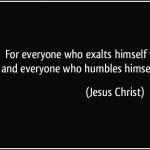I was delighted to have the opportunity to watch the Netflix movie Come Sunday before its release to the public on April 13th. The movie is based on the true story of the life of Pentecostal Bishop Carlton Pearson, who came to change his mind about hell. It is a really nice touch that the movie starts with the Bible, a well worn annotated one, showing that it is the Bible that is central to Pearson’s story and the way his views evolved and changed.
The conversation that we see next between Pearson and a lawyer on a plane illustrates religious differences between Christian traditions, as this Catholic woman doesn’t know what an altar call is, or what “getting saved” means. They talk about purpose, family, and dealing with hardship. Then we hear him talking to a church about the fact that he needed to talk to her in order to save her from hell. He talks about different traditions between whites and blacks when it comes to how children are disciplined. These scenes help viewers who may not be familiar with this evangelistic Protestant approach to Christianity to understand where its focus lies.
After talking to an uncle who is in prison, Rev. Pearson consults with a minister whose son was gay and who killed himself. Later, Pearson gets the call that his uncle hung himself. That clearly influences him, but more decisive is his reaction to news from Rwanda about children being murdered, including Catholics and Muslims. He preaches that God reassured him that those children do not go to hell – and members of his congregation are shocked. It makes Christian radio and is widely discussed and debated.
Eventually he finds himself feeling free as he becomes convinced that the blood of Jesus covers everyone. Oral Roberts (played by Martin Sheen) calls it heresy and suggests that it is the devil that is persuading Pearson to think this way rather than God.
The following Sunday he preaches again, apologizing for having blurted out what he was thinking in the way that he did. He initially preaches from Romans 10:9 as Oral Roberts instructed him to. But he then shifts to 1 John, where it says that Jesus died not only for our sins, but for the sins of the whole world. The conclusion that he draws is that everyone is saved as a result of the finished work of Christ. He is accused of rewriting the Bible, and Pearson replies that he isn’t rewriting it but just rereading it. He says that we are instructed to study the scriptures, and there are contradictions, with there being passages that speak clearly about God saving everyone. He says that if we envisage God sending millions to hell, that God is a monster – and that leads to significant numbers of the congregation getting up and walking out.
Henry, a member who decides to leave his church insists that Carlson is out of fellowship with God, and risking his eternal soul, but Carlson insists that he has never felt closer to God.
It is probably impossible to portray a process of internal struggle and wrestling better than the film did, but the change of viewpoint did seem sudden – yet that’s how it often seems when people change their mind, when we don’t know how they’ve been reflecting and rethinking. But the film later on does a really good job of depicting the emotion as the pastor loses longtime friends as a result of his change of mind.
The conversations between the pastor and his church organist Reggie, who is gay, as well as between Pearson and his mother, are especially powerful, and give us glimpses of important developments in and influences on his thinking. Pearson realizes that his focus on getting people saved led him to not help his uncle when he needed him. And he realizes that, if hell is taken out of the picture, he needs to figure out what the messages is.
Pastor Yvette Flunder appears on television saying that the theology Pearson has espoused doesn’t surprise her – she and others have been proclaiming this inclusiveness for years. Then joint council of African-American bishops from his own denomination invite him to explain his views to them. This leads to a scene that is featured in the trailer for the movie, in which Pearson asks one of his fellow bishops whether there is anyone close to him that is in hell, and when he says his father is, Pearson asks whether he’d get his abusive father out of hell, and thus the question we have to ask ourselves is whether we are more merciful than God. The scene continues with the bishop in question insisting that believing and confessing Jesus is the only way to be saved – and then contents of Pearson’s church being auctioned off. Later Pearson guest preaches at Flunder’s church, which is opening and affirming. He talks of learning what it feels like to be an outcast, and the comfort that we take from the fear of hell – because it scares us less than the idea that God loves all unconditionally, which would mean that we should too.
You can watch the movie on Netflix on April 13th. If you’re interested in American Christianity or theology at all, it is worth watching. But it is even more important to watch if you recognize the importance of daring to reconsider our deepest assumptions, because those assumptions affect our actions and the way we treat others. It is a movie that encourages us to be willing to have the courage to stand for our convictions even when it costs us dearly. And it is a movie that illustrates the strength and power that some assume can only be found in the fervent preaching tradition that scares people with hell, but which manifests in deeper and richer ways when we overcome fear and embrace love.













